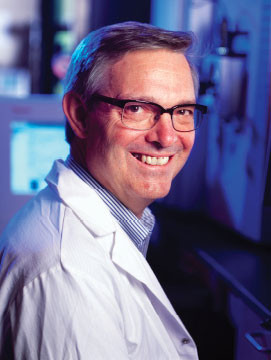Robert Haltiwanger, Ph.D.
Glycoscience
The University of Georgia
Recruited: 2015
Robert Haltiwanger is shedding light on the intricacies of how cells communicate and determining how this knowledge can be used to develop new drugs for a host of health issues.
An early breakthrough by Haltiwanger set the stage for a new class of potential drug candidates for Alzheimer's disease. Now, he and his colleagues are applying the same process on a broader scale.
Haltiwanger is a world-renowned researcher in the emerging field of glycobiology, which explores the structure and function of complex carbohydrates. Hybrid molecules of proteins and complex carbohydrate (called glycoproteins) line the exterior of every cell, playing major roles in cellular communication. These important glycoproteins are shaped by enzymes, which form or remove connections between the carbohydrates and proteins.
As enzymes work to shape or remodel the cell surface, they can facilitate communication between cells — or bring it to a halt. A single enzyme being activated or deactivated may lead to cancer, cardiovascular defects, degenerative disorders or developmental disorders.
Haltiwanger and his colleagues study more than a dozen of these enzymes. First, they identify the genetic sequence — the specific DNA — that gives rise to a particular enzyme. Identification of the genes allows them to make connections to human diseases where the gene is known to be mutated. Then, they create a genetically modified cell or mouse without that DNA. This allows them to “turn off” the key enzyme, and observe the downstream effects: both to the cells and the organism as a whole.
Once Haltiwanger identifies an enzyme’s functions and the role it might play in causing a certain health issue, he and his team then set off to find an inhibitor drug. They will first work with the enzyme alone in a test tube to identify inhibitors, then assess the inhibitor's effect on the enzymes in cells in culture. If successful, Haltiwanger can move on to trials in mice.
Haltiwanger and his colleagues demonstrated the success of this approach in the '90s, when they were the first to use a small-molecule inhibitor of the enzyme O-GlcNAcase in cells. Their research became a foundation for developing future generations of O-GlcNAcase inhibitors, now a class of promising drug candidates for treating Alzheimer’s. These inhibitors stop O-GlcNAcase from excessively removing carbohydrate molecules from "Tau proteins," which play important roles in neurons.
Today, one of Haltiwanger’s most active areas of inquiry is the Notch receptor, a carbohydrate-modifiable protein found on the surface of cells. Because it binds to structures found on the surfaces of surrounding cells, Notch functions in cellular communication. Defects in Notch can cause a number of diseases, including some forms of cancer, congenital heart defects, and vascular disorders. Exploring various enzymatic effects on Notch – and inhibitors that could alter those effects – could lead to valuable therapeutics.
With his appointment to The University of Georgia’s Complex Carbohydrate Research Center, Haltiwanger and his lab will have expanded opportunities to extend knowledge of cell communication and develop essential enzyme inhibitors for drug research.
Research
Current research projects in the Haltiwanger lab include:
- O-Glycosylation of Epidermal Growth Factor-Like Modules - Determining the site-specific O-fucose and O-glucose glycosylation patterns on mouse Notch1 and Notch2, analyzing effects of eliminating O-fucose sites of glycosylation on mouse Notch1 and Notch2 in cell-based signaling assays, analyzing effects of alterations in O-fucose glycans on the structure and function of the Notch receptor.
- Role of Thrombospondin Type 1 Repeat O-fucosylation in Peters-plus syndrome - Characterizing effects of mutations in B3GLCT, a glucosyltransferase that’s mutated in Peters-plus patients.
Choosing Georgia
Robert Haltiwanger was drawn by the opportunities for collaboration at the University of Georgia’s Complex Carbohydrate Research Center, one of the world’s top centers for glycoscience research. “There are tremendous capabilities here,” said Haltiwanger. “I’m very much looking forward to being a part of it.”

